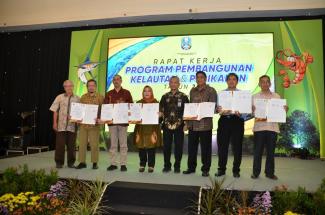Support for sustainable shrimp farming development in East Java Indonesia
On 15 June 2022, UNIDO, as part of its Global Quality and Standards Programme (GQSP) Indonesia, signed Memorandum of Understanding (MoU) with the East Java Provincial Marine and Fisheries Agency (DKP) and Indonesian Shrimp Forum (FUI), to support the development of eco-friendly and sustainable traditional shrimp farmers in the province.
Under the newly signed MoU, the Provincial Marine and Fisheries Agency of East Java will designate locations in few districts in East Java for piloting the Standard Operating Procedures (SOP). GQSP Indonesia, together with Indonesian Shrimp Forum, will provide technical support and facilitate linkages with buyers and processors as up takers. In addition, the Sustainable Shrimp Farming Programme will also elaborate with mangrove rehabilitation through mangrove planting surrounding the shrimp ponds. Integrated mangrove-shrimp cultivation has emerged as a part of the potential solution to blue carbon emissions. At the same time, it also has economic potential for carbon trading and mangrove ecotourism.
The MoU was part of a series of agreements signed between Provincial Marine and Fisheries Agency on behalf of the provincial government of East Java and various parties including with universities, private sectors, financial agencies, shrimp farmers groups and fisheries offices from various districts in East Java to support traditional shrimp farmers to improve productivity and sustainable practices towards eco-label certification.
GQSP Indonesia, funded by Switzerland through the State Secretariat for Economic Affairs (SECO), in collaboration with Indonesian Shrimp Forum, has developed SOP for improving productivity of traditional shrimp farming in Indonesia. Large areas of shrimp farming in Indonesia, estimated to be around 250,000 Ha, are traditional farming with very low productivity ranging from 100-300 Kg/Ha/harvest. With limited intervention as prescribed in the SOP, the productivity of traditional shrimp farming could be increased to 1,000 kg/Ha/harvest; a significant increase of 10 folds increase.
For further information contact Nima Bahramalian (N.Bahramalian [at] unido.org (N[dot]Bahramalian[at]unido[dot]org))

